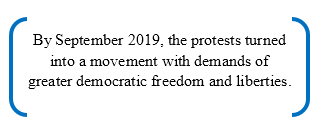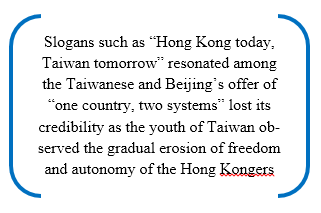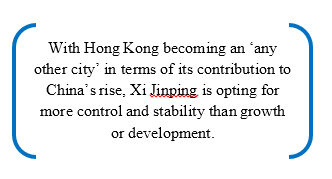Ananya Raj Kakoti, former Research Intern

On 30 June, 2020, President Xi Jinping signed a National Security Law which will drastically curb the freedoms that Hong Kong exclusively enjoys because of its ‘Special Administrative Region’ status. On the very same day, at 23:00 hours local time, an hour before the anniversary of the British handover which happened in 1997, the law came into effect. But, this was only one of the many nails that China has hammered into the coffin of Hong Kong’s ‘higher degree of autonomy’ status.
In 2018, the murder in Taipei, involving two Hong Kongers led to several complications as there is no extradition treaty between Taiwan and Hong Kong. In 2019, Beijing used this opportunity and proposed changes to update Hong Kong’s existing extradition laws claiming that the 2018 murder acted as a catalyst to the formulation of this bill as it highlighted a major “legal loophole”. The Fugitive Offenders and Mutual Legal Assistance in Criminal Matters Legislation (Amendment) Bill 2019 allows the Hong Kong government to detain and transfer individuals wanted in territories and countries with no former formal extradition agreement for trial, which includes Taiwan and Mainland China.

This bill triggered the Anti-Extradition Law Amendment Bill Movement 2019, or the popularly known as ‘2019-20 Hong Kong protests,’ causing massive protests to erupt in the city. This bill also caught the attention of many countries which led to diplomatic pressures on the city’s government, with Britain and Canada showing concern for their citizens in the city, the EU issuing a diplomatic note to Chief Executive of Hong Kong, Carrie Lam and the US pointing out that this action will make Hong Kong vulnerable to China’s “political coercion” to which China responded by asking them to not interfere in China’s internal matters and “politicise” the proposal. In September 2019, Chief Executive Carrie Lam formally withdrew the bill, but by then the protests had ballooned into a movement with demands of greater democratic freedom and liberties.
As the protests entered 2020, the onset of the COVID-19 outbreak steadily de-escalated the unrests and movements with social distancing became the norm and with it, through voluntary civil society initiatives and legal measure, crowd gatherings were discouraged, giving an impression of apparent “peace” being restored. When the media, in May, announced the drafting of a new bill by the Standing Committee of the National People’s Congress (NPCSC) covering “secession, foreign interference, terrorism, and subversion against the central government,” which was to be added to Annex III of the Hong Kong Basic Law, it caused several diplomatic fallouts. The UK, Australia, Canada and the US, gave a joint statement expressing concern regarding the proposal, as it was understood to violate the Sino-British Joint Declaration, and a dismissal of the “one country, two systems” principle. This draft also ignited the dormant movement and Hong Kong witnessed the largest protest, since the onset of the pandemic.

In March 2021, during the most recent National People’s Congress (NPC), there was a proposal of drastically overhauling Hong Kong’s electoral system, to ensure that city is only governed by “patriots.” While addressing the NPC, Premier Li Keqiang warned the world to not interfere in their matters. Wang Chen, NPC vice-chairperson announced that the changes were necessary as “the rioting and turbulence that occurred in Hong Kong society revealed that the existing electoral system has clear loopholes and deficiencies”. One can say that this is an extremely interesting proposal because the Chief Executive of the city who is responsible for governing and administering the internal matters of the city, implementing laws, deciding policies, and others, is “elected by a broadly represented Election Committee in accordance with [the Basic] Law and appointed by the Central People’s Government” as established by Annex I of the Basic Law of Hong Kong. Thus, ensuring that the electoral college responsible for the election is filled with professionals, representatives, and elites of Hong Kong who are Beijing loyalist, who consequently will elect a pro-Beijing Chief Executive.
These past two years have not been the only time when China has tried to meddle in Hong Kong’s matters. China has tried to encroach on the internal matters of Hong Kong through various means by pursuing policies that could blur the status of Hong Kong being separate from the mainland. In 2003, Hong Kong protested against the city government’s plan to impose controversial and stringent sedition and internal security laws. 2012 saw mass protests when Beijing tried to implement a compulsory Chinese school curriculum, which was later made voluntary, praising Chinese communism and influence the education system of Hong Kong. Protesters said it was to “brainwash” the students. In 2014, a decision was issued by the Standing Committee of the National People’s Congress (NPCSC), popularly known as the ‘31 August Decision’ in response to the demands of universal suffrage by the pro-democracy activists, which set parameters for the 2017 Chief Executive elections. According to the new framework, had it been adopted, citizens of Hong Kong would have been given the privilege of universal suffrage.However, the nominated candidates will have to be selected by the new nomination committee comprising of pro-Beijing members, ensuring no pro-Democrat candidate could ever get nominated. This proposal enraged the citizens, giving birth to the ‘Umbrella Revolution.’

On the eve of the 23rd handover anniversary, the National Security Law was passed, signed and implemented without informing, the city government or the public, the content of the law. Canada, the UK, Australia, the US, New Zealand and Germany, suspended their extradition treaty with Hong Kong. The US had one of the most severe responses to the law, as it went on to impose sanctions on Chinese and Hong Kong officials, including Chief Executive Carrie Lam, in response to undermining the city’s freedom of speech and political freedom, as a sign of standing with the people of Hong Kong. Considering the souring relations between Beijing and Washington, the US took the opportunity to show its support to the people of Hong Kong in their fight for political freedom and greater democracy. Steven Mnuchin, the then secretary of the treasury said, that “[they] will use [their] tools and authorities to target those undermining [Hong Kong’s] autonomy.” Mike Pompeo, the then US Secretary of State also stated that Hong Kong no longer enjoys a higher degree of autonomy from China and that the new bill “fundamentally undermines” the autonomy and freedoms of Hong Kong, therefore can no longer receive special treatment under US law. The UK, who was party to the Joint Declaration in 1984 obligating them to ascertain the the provisions of the treaty is adhered to, responsed to this bill by announcing special resettlement policies for the British National (Overseas) Passport holders in Hong Kong from early 2021, in retaliation to which, the Chinese authorities said it will de-recognised BN(O) as a travel and identity document from 31 January 2021.

The COVID-19 pandemic also aided China in its decisions, with the world distracted and the pandemic restricting large-scale protests. At the UN Human Rights Council in Geneva, on June 2020, Cuba on behalf of 53 countries gave a statement in support of the law and criticised the discussion of the law as it is China’s internal matter, as opposed the 27 countries, represented by UK, who were against the law. According to the Freedom House’s global rating, all the 27 countries against the law are considered “free”, and the countries backing China, which includes Saudi Arabia, Syria, North Korea, are either “not free” or “partially free.” Three small “free” countries also backed China but they, along with several other countries supporting the law are involved in China’s BRI project. Most of the African countries supporting the law are trying to re-negotiate their way out of China’s debt-trap. China’s economic power in terms of its huge investments across continents, could leverage the support of UNHRC for a law it was established to oppugn.
The 2019-20 Hong Kong protests influenced Taiwan’s 2020 election, as it helped the young voters of Taiwan imagine what their future might hold, which finally led to the landslide re-election of President Tsai. Slogans such as “Hong Kong today, Taiwan tomorrow” resonated among the Taiwanese and Beijing’s offer of “one country, two systems” lost its credibility, as the youth of Taiwan observed the gradual erosion of freedom and autonomy of the Hong Kongers. China-Taiwan relations and the island democracy’s domestic policies will be drastically affected seeing China impose such draconian laws on Hong Kong.
India has an extradition treaty with Hong Kong through the 1997 Surrender of Fugitive Offenders treaty. Keeping in mind the large Indian community in Hong Kong, along with the many Indian professionals, and students, India can consider re-examining and altering the various extradition and travelling policies with the city. But it must also be noted that the treaty exempts Indian citizens “for an offence of a political character.” India has not released any statement yet from its Ministry of External Affairs, New Delhi, but its representative at the UN Human Rights Council in Geneva, Rajiv Kumar Chander did point out that India has been “keeping a close watch on recent developments. [They] hope relevant parties will take into account these views and address them properly, seriously and objectively”. However, if India decides to suspend the extradition treaty with Hong Kong like many other countries, it will indicate India’s position regarding the imposition of the National Security Law.

Hong Kong since its handover in 1997, after Britain’s 99-year lease had come to an end, has been fighting for its political freedom. The signing of a Joint Declaration between Chinese Premier Deng Xiaoping and British Prime Minister Margaret Thatcher, at the time of the handover, grants Hong Kong a relatively “high degree of autonomy” for at least another 50 years, until 2047, to “preserve Hong Kong’s familiar legal system and the rights and freedoms enjoyed there,” according to Thatcher, with the intent of Hong Kong’s “continued stability, prosperity and growth”, eventually making the transition a smooth process. Hong Kong did prosper under the “one country, two systems” principle, a feature enshrined in the Basic Law of the Hong Kong Special Administrative Region of the People’s Republic of China, according to which China’s laws cannot be applied to Hong Kong, except for in the matter of foreign affairs and defence, listed in Annex III of the document. The city became an international hub for finance and investments, allowing its economy to boom, a “golden goose” of Communist China. It also helped mainland businesses to raise capital from global investors yet, the current leadership is willing to sacrifice it, and one might wonder why. The reason might be that Hong Kong’s significance in China’s economy has dwindled considerably, compared to what it was in 1997, with Shanghai, Beijing and Shenzhen leading the race. With Hong Kong becoming an ‘any other city’ in terms of its contribution to China’s rise, Xi Jinping is opting for more control and stability than growth or development. Hong Kong has lost its leverage to maintain its autonomy till 2047, this can only mean that by no means will China allow for more democratic freedom to the city than it already enjoys and no amount of international rebuke will make the country change its decision. As the battle for freedom in Hong Kong continues, with the citizens fighting for their rights hammer and tongs, one can only hope that this city emerges victorious, for now not only its political freedom is at stake, but also its economic future.